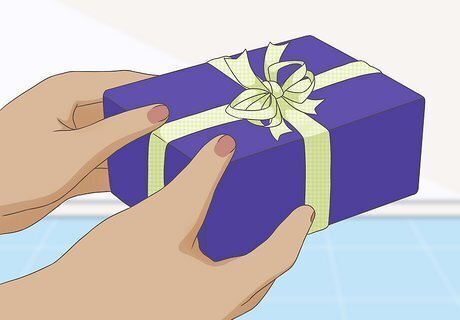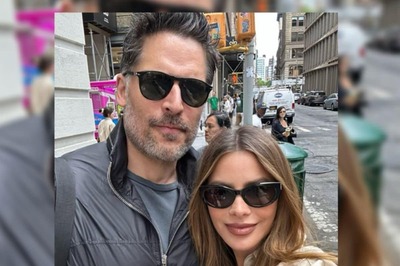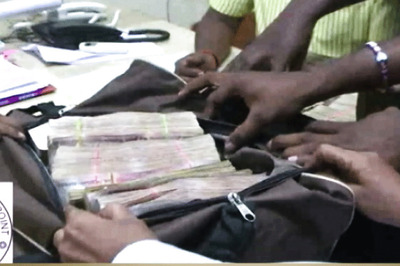
views
- Give your partner the benefit of the doubt: maybe a present is on its way, or maybe they forgot the holiday.
- Not getting a gift hurts, but try not to let it ruin your whole day. Treat yourself to a V-Day present, or try to pretend it isn't Valentine's Day at all.
- Ask yourself if you and your partner are on the same page about Valentine's Day. If you didn't say you wanted to celebrate, your expectations may be mismatched.
- Calmly communicate your disappointment to your partner. Let them know how much the day means to you and see if they'll celebrate it in the future.
Waiting It Out

Avoid high expectations. You may love the idea of grand romantic gestures, but the reality is they don't often happen in real life. Your partner may not be comfortable with them, or they might not know you'd appreciate a grand gesture unless you specifically say so. (Not everyone enjoys being on the Kiss Cam at the ballgame!) Not getting a gift for Valentine's Day really hurts, but if you're disappointed because you had certain expectations for how today would go, maybe it's worth reflecting on why you had those expectations and whether they were reasonable. If you were expecting your partner to purchase a gift and they didn't, consider that they may be struggling financially. The unfortunate truth about grand gestures is, unless your partner is a millionaire, it might not be reasonable to expect them. The average person spends about $142 on Valentine's Day gifts, but keep in mind how averages work. For every wealthy individual who buys a lover an expensive sports car, thousands of others may only go with a $10 box of chocolates or a cheap bottle of wine.

Try not to react at all until at least after dinner. Many people wait to surprise their significant others with a gift in the evening, so if Valentine’s Day isn’t over yet, it’s still very possible a gift is on its way. This is especially important to remember if you and your partner don't live together and won’t see each other until later in the day. It’s so disappointing not to receive a Valentine’s Day gift when you were expecting one! But ask yourself if it’s possible you got a gift…and just didn’t realize it. For example, maybe you were hoping for a bouquet of roses before dinner, but for your partner, a nice meal was the gift.

Go about your day as normally as possible. Feeling neglected on Valentine’s Day can really bring you down, but try to avoid letting it affect the rest of your day. If you’re seriously upset, try your best to pretend it's not Valentine's Day at all. Unlike most major holidays, Valentine's Day is relatively easy to ignore. Try not to listen to the radio or watch television; advertisements and talk show chatter will probably be Valentine's Day-oriented.

Steer clear of jealousy. If you work on Valentine's Day, you may see coworkers with flowers or chocolates. Don't be jealous of them. You have no idea what their relationships may really be like. Flashy displays of affection through monetary goods don't reflect how someone truly feels. Try your best to remember all the times where your partner has shown you love. Stay off social media in case people are posting pictures of their gifts there.

Give your gift. Surprise your partner with a gift when you were originally planning to do so. It’s understandable to feel bummed if your partner didn’t get you a gift, and you may even feel a little foolish if you got them one, but remember: the purpose of gifts is to give without expectation of return. Besides, your partner may have actually gotten something for you after all but was unsure of the right time to exchange gifts, and once you give yours, they’ll give theirs. Be prepared not to receive anything in return, just in case. If your partner doesn't give you a gift, they're likely to feel bad. You can be honest that you're disappointed, but if you're in public (say, out to dinner), avoid hashing it out until you're in private. You don't have to lie, but you can say, "I'm a little hurt, but we can still have a nice time." You can also hold off giving your partner your gift until you're in private: this way, if they don't give you a gift in return, you don't have to hold a brave face through the rest of dinner (or whatever your activity is) if you think you'd have a hard time doing so.
Understanding Why

Consider if anything may have kept them from getting you something. Even in the age of internet shopping and free shipping, sometimes things can get away from us. Consider if your partner has had anything significant going on that might have made them forget or kept them from prioritizing Valentine’s Day. For example, don't expect too much if their parent passed away the week before. For anxious perfectionists, shopping for the right gift can take a lot of time and effort. Your partner may have had to deal with an unexpected deadline at work and had to temporarily put everything else on hold. Just be sure to let them know how you feel if you're disappointed.

Ask yourself if you’re on the same page about the holiday. Consider your conversations from the last few weeks. At any point, did either of you mention anything about disliking Valentine's Day or not wanting a gift? If you didn’t clarify your feelings about the holiday, your expectations may be mismatched. Some people feel obligated to say that they don't want a gift when they actually expect one to avoid seeming shallow or greedy. If you expressed this, your significant other may have taken your words at face value. If this is the case, you may need to work on communicating your desires more honestly. Your partner may have had a negative or traumatic experience associated with Valentine's Day and may feel uncomfortable celebrating it. If you consider your relationship close, ask about what happened and if there's anything you can do to help the healing process.

Ask if your partner knows what today is. If your partner doesn't realize it's Valentine's Day, then it’s no wonder they didn’t get you a gift! It might still sting, but try to show grace and not take it to heart, especially if they’re a great partner otherwise. Some people are just very forgetful about dates. If your partner apologizes and offers to make it up to you soon, accept the offer gracefully. Others may be new to dating and are unsure about the gift-giving etiquette that surrounds the holiday. If you are more experienced, explain the unwritten rules to your significant other. This may be a good opportunity for you each to define how serious you think the relationship may be. Your partner may be from another country and not even know what Valentine's Day is. Many cultures celebrate Valentine's Day in very different ways, and some don't observe it at all. If that's the case, simply explain to your significant other the importance of this holiday to you. Suggest to celebrate and exchange gifts on a certain day at least a week or two away.

Consider if your relationship status warrants a gift. If you just had your first date on February 12, don't expect your new partner to surprise you with a bouquet of roses. Conversely, if you've been together for years, it's not unusual to skip Valentine's Day. On average, married couples spend significantly less on their partners than couples who are dating. If you're upset about a missed Valentine's Day and your partner doesn't appear concerned or apologetic, this can be a bad sign. This is especially true if your significant other even goes so far as to tease or admonish you for caring about the holiday. While Valentine's Day may have become a marketing gimmick, you have every right to enjoy the holiday. When one partner invalidates another's feelings, their relationship may be unhealthy.

Explain your feelings to your partner. Tell your partner that you enjoy celebrating Valentine's Day and were hoping for a gift. Suggest the possibility of an alternative "Valentine's Day" just for the two of you. Be sure to use "I-statements" while discussing the subject. I-statements usually begin with "I feel" and go on to explain your emotions. In conflict resolution theory, I-statements allow you to express emotions caused by another's actions (or inactions) without blame. An example I-statement for this situation would be: "I feel a little disappointed that I didn't receive a Valentine's Day gift from you this year." Remember to reaffirm that you care about your partner. Be clear that while you may be disappointed, your relationship isn't in jeopardy. Don't have this conversation while angry. If this experience has seriously upset you, calm yourself first by going for a walk or sleeping on it.

Tell your partner what kind of gifts you like. If your partner didn't get you anything, or if they didn't get you something you wanted...well, you may just have to tell them directly what you were expecting. There's nothing wrong with asking for what you want, and it's an important part of honest communication. It would be great if our significant others could read our minds, but that’s not really the way things work, unfortunately. It might not seem sexy to have to tell your partner that you really want to wake up on Valentine's Day to a box of truffles on your nightstand and rose petals littering your floor, but in most non-romcom relationships, that's exactly what needs to happen.


















Comments
0 comment